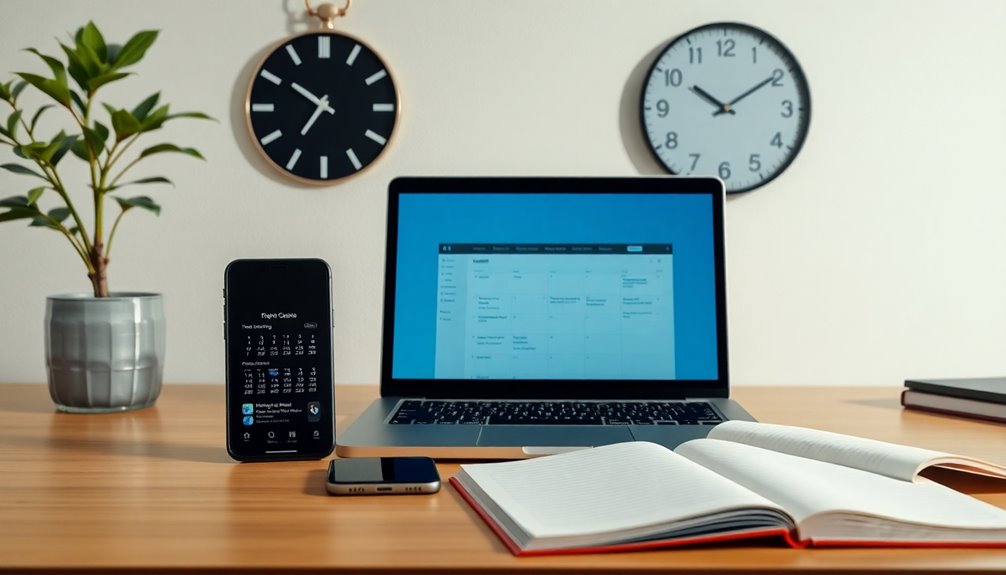When preparing for insurance job interviews, expect essential questions that assess your knowledge and fit for the role. Be ready to discuss your understanding of the industry, the company's values, and how you can contribute to the team. Common inquiries often include, "What do you know about our company?" and "How do you handle stress?" Use the STAR method to illustrate your experiences and problem-solving skills. Additionally, practice active listening during the conversation. Engaging fully will not only help you answer questions effectively but also enable you to form meaningful connections—keep an eye out for more insights ahead.
Key Takeaways
- Prepare for common questions like "Why insurance?" to demonstrate your motivation and understanding of the industry.
- Familiarize yourself with the company's products and services to effectively answer "What do you know about our company?"
- Use the STAR method to structure responses for behavioral questions, showcasing your problem-solving and teamwork skills.
- Be ready to discuss your salary expectations, backed by industry research and your experience level.
- Engage with the interviewer by asking insightful questions about the company culture and growth opportunities.
Pre-Interview Preparation

Before you step into an insurance job interview, it's crucial to gear up properly. Start by expecting a screener call, typically lasting 15 to 30 minutes, where you'll discuss your background and skills in detail.
Research the company and prepare to ask about the interviewer's name for a personalized touch. Arrive or log in 15 minutes early to account for any unexpected delays.
During the wait, practice breathing exercises to maintain composure and focus your mind. Review your resume and key experiences to guarantee you're ready to highlight your qualifications.
This preparation sets the stage for a smooth and successful interview, showcasing your professionalism and commitment to the role.
Understanding Salary Expectations

As you prepare for your interview, it's equally important to have a solid understanding of salary expectations. Research industry standards to determine a reasonable salary range using tools like the Indeed salary calculator. This gives you a solid foundation to discuss compensation without quoting a specific number.
When asked about your salary expectations, provide a range based on your research, experience, and the role's requirements. Remember, salary negotiations are best saved for the offer stage, so focus on demonstrating your fit for the position during the interview.
Also, consider how factors like location and your level of experience can impact your expected salary, ensuring you approach the topic with confidence and clarity.
Small Talk Strategies

Small talk often plays an essential role in setting the tone for your interview. It helps break the ice and creates a relaxed atmosphere.
Start by observing your surroundings—mention something positive about the office decor or environment to spark a conversation. Ask open-ended questions about the interviewer's experiences or the company culture, showing genuine interest.
Keep the conversation light and professional; steer clear of sensitive topics. Listen actively and respond thoughtfully to build rapport.
Remember, small talk isn't just filler; it's an opportunity to showcase your interpersonal skills and enthusiasm for the role.
Common Interview Questions

When preparing for an insurance job interview, anticipating common interview questions can greatly enhance your confidence and performance.
You'll likely face general questions like, "Tell me a little bit about yourself," and "Why do you want to work in the insurance industry?" Be ready to discuss your strengths and weaknesses, as well as customer service scenarios.
Expect inquiries about your experience, such as, "What value will you bring to our company?" or "Do you have experience working with claims?"
Additionally, prepare for questions regarding ethical considerations and your adaptability to industry changes.
Practicing your responses will allow you to convey your skills effectively and demonstrate your fit for the role.
Behavioral Question Techniques

Understanding behavioral question techniques is essential for effectively showcasing your skills during an interview. These questions typically ask you to describe past experiences that demonstrate your abilities, so use the STAR method: Situation, Task, Action, Result.
Start by briefly setting the context, then explain your specific role and responsibilities. Next, detail the actions you took to address the situation, and conclude with the positive outcomes achieved.
Prepare several stories that highlight your problem-solving skills, adaptability, and teamwork. Anticipate follow-up questions, as interviewers often seek deeper insights into your experiences.
Practicing these responses will help you feel confident and articulate when discussing your past, ultimately positioning you as a strong candidate for the role.
Addressing Challenging Topics

Addressing challenging topics during an interview can be intimidating, but being prepared can turn these situations into opportunities to demonstrate your resilience and adaptability.
When faced with tough questions, focus on framing your responses positively. Here are some strategies to help you navigate these discussions:
- Practice your responses: Anticipate difficult questions and rehearse your answers to boost confidence.
- Stay calm and composed: Take a moment to gather your thoughts before responding to maintain poise.
- Highlight growth: Frame past challenges as learning experiences that helped you develop professionally.
- Be honest but strategic: Address sensitive issues honestly while emphasizing your commitment to improvement and adaptability.
Importance of Asking Questions

Steering through challenging topics in an interview can reveal a lot about your character, but it's equally important to engage with your interviewer by asking questions. By doing so, you create a conversational atmosphere, making the interview feel more like a discussion than an interrogation.
Asking about company culture, team dynamics, and role expectations shows you're genuinely interested in the position and the organization. It also helps you assess whether the company aligns with your personal values and career goals.
Company Research Tips

Researching a company before your interview is essential for making a strong impression. It shows you're genuinely interested in the role and helps you tailor your responses.
Here are some effective tips to guide your research:
- Understand the company's mission and values: This helps you align your answers with their goals.
- Familiarize yourself with recent news: Knowing current events related to the company can spark engaging conversations.
- Explore their products and services: Being knowledgeable about what they offer demonstrates your initiative.
- Check employee reviews on platforms like Glassdoor: Gaining insights into company culture can prepare you for questions about fit.
Role-Specific Technical Skills

Understanding the role-specific technical skills required for an insurance position is essential for your success in the interview process. These skills not only demonstrate your qualifications but also show your readiness to tackle industry challenges.
Here's a quick reference table to help you identify key skills:
| Skill | Importance | Example Application |
|---|---|---|
| Industry Regulations | Guarantees compliance | Knowledge of state laws |
| Risk Assessment | Identifies potential issues | Evaluating policy applications |
| Customer Service Skills | Enhances client relationships | Managing claims inquiries |
Familiarizing yourself with these skills will prepare you to answer technical questions confidently, showcasing your expertise and fit for the role. Make certain to highlight any relevant certifications or specific experiences during your interview.
Closing the Interview Effectively

As you approach the end of your interview, it's crucial to leave a lasting impression. Summarize your qualifications succinctly and express genuine enthusiasm about the role. This is your moment to reinforce why you're a great fit.
Here are some key points to cover:
- Recap your strengths: Briefly highlight the skills that make you a strong candidate.
- Express appreciation: Thank the interviewer for their time and insights.
- Ask about next steps: Inquire about the timeline for the hiring process, showing your interest in moving forward.
- Clarify any remaining questions: Address any uncertainties you might've about the role or company.
Closing effectively can set you apart and keep you top of mind for the interviewer.
Frequently Asked Questions
How Do You Prioritize Tasks in a Fast-Paced Work Environment?
In a fast-paced work environment, you prioritize tasks by evaluating urgency and importance.
Start by listing all your tasks, then categorize them using a matrix. Focus on high-impact items first, breaking larger projects into manageable steps.
Stay flexible; things can change quickly, so be ready to adjust your priorities. Use tools like to-do lists or digital planners to keep track, ensuring you meet deadlines without sacrificing quality.
What Motivates You to Succeed in the Insurance Industry?
Did you know that the insurance industry is projected to grow by 5% over the next decade? This growth motivates you to succeed because it means more opportunities for innovation and client service.
You thrive on helping people protect their assets and achieve peace of mind. The challenge of maneuvering complex regulations excites you, and you're driven by the potential to make a meaningful impact in clients' lives through your expertise.
Describe a Time You Resolved a Conflict With a Client
Think about a specific situation where you faced a conflict with a client.
You calmly listened to their concerns, acknowledging their feelings.
Then, you asked questions to understand the issue better, creating an open dialogue.
By providing a clear solution and setting realistic expectations, you turned the situation around.
Ultimately, the client appreciated your effort, and you strengthened that relationship, showcasing your ability to handle conflicts effectively and professionally.
How Do You Stay Updated on Industry Trends and Regulations?
To stay updated on industry trends and regulations, you should regularly read industry publications and follow relevant blogs.
Joining professional organizations and participating in webinars can also help you gain insights.
Networking with colleagues and attending conferences allows you to exchange knowledge and experiences.
Don't forget to utilize social media platforms like LinkedIn to connect with industry experts and engage in discussions that keep you informed about the latest developments.
What Role Does Teamwork Play in Your Work Approach?
Teamwork plays an essential role in your work approach.
You thrive in collaborative environments, where sharing ideas and perspectives enhances problem-solving. By actively engaging with your colleagues, you create a supportive atmosphere that fosters creativity and innovation.
You understand that effective communication and mutual respect are key to achieving common goals. When everyone contributes their strengths, you all succeed together, leading to higher productivity and a more enjoyable work experience.
Conclusion
As you wrap up your preparation, remember that every interview is a chance to shine and showcase your unique skills. Embrace the opportunity to chat about your experiences and learn more about the company's culture. By approaching the interview with confidence and curiosity, you'll not only impress your potential employer but also discover if this role is the perfect match for you. So go ahead, step into that interview room and let your talents speak for themselves!









